Bringing a new puppy into your home is an exciting time, filled with joy and new responsibilities. Among the most crucial aspects of puppy care is protecting them from internal parasites, commonly known as worms. Puppies are highly susceptible to these unwelcome guests, often acquiring them even before birth. These internal parasites can lead to severe health issues, ranging from stunted growth and dull coats to life-threatening anemia and organ damage. This is why understanding and implementing a proper deworming schedule, especially with the right Deworming Tablets For Puppies, is not just a recommendation but an essential act of care for your furry friend and your family’s well-being.
Internal parasites are far more common in dogs than most pet parents realize. Puppies can acquire worms even before birth, while adult dogs can pick them up from contaminated soil, fleas, infected feces, or even during playtime at the park. These worms typically reside in the intestines and can cause a host of health problems. Therefore, selecting the correct dewormers for dogs and adhering to a strict deworming schedule is paramount. Regular deworming protects your pet and ensures a safer environment for your household. Establishing a consistent routine early on, potentially incorporating effective flea treatment for dogs alongside deworming, can provide comprehensive parasite protection from a young age.
How Frequently Should You Deworm Your Puppy?
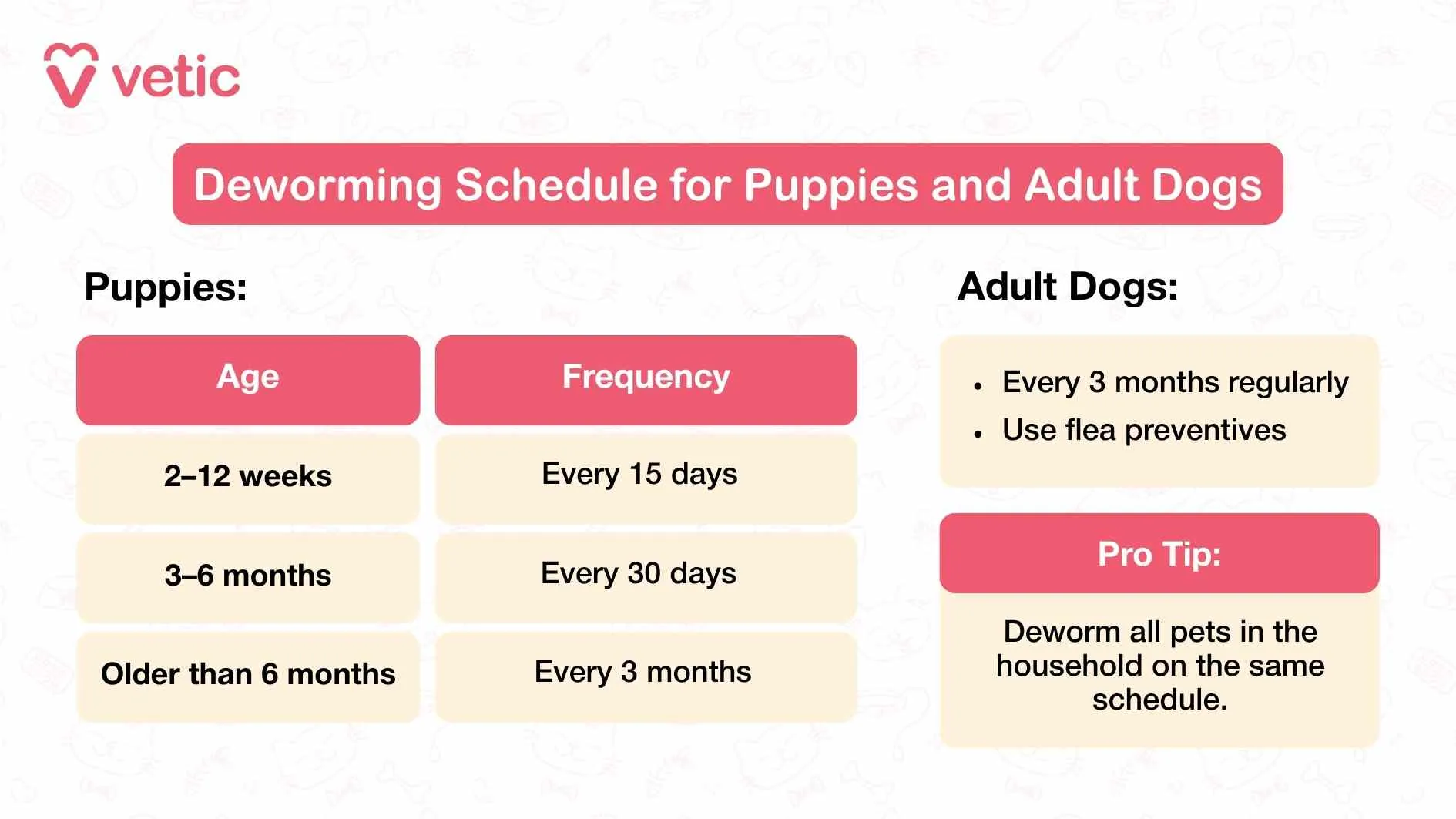 Visual guide outlining the time-sensitive deworming schedule for puppies and adult dogs, emphasizing early and frequent dosing for young pups.
Visual guide outlining the time-sensitive deworming schedule for puppies and adult dogs, emphasizing early and frequent dosing for young pups.
A puppy’s initial deworming is just as vital as their first vaccinations. Puppies as young as 30 days old should have their first vet visit for deworming. At this stage, most puppies receive a liquid deworming medicine, precisely measured according to their body weight. This early intervention is critical because puppies constantly explore their environment with their mouths, making them highly vulnerable to parasite exposure.
Between 1 to 3 months of age, deworming should be repeated every 15 days. As they grow, from 3 to 6 months, the schedule typically shifts to monthly doses. After 6 months, most dogs transition to a quarterly deworming regimen. Your veterinarian may adjust this schedule based on your puppy’s individual needs, such as their appetite, growth rate, or the results of a stool test. It’s important to remember that skipping even a single dose can allow worms to multiply rapidly, compromising your puppy’s health.
Are Puppy Dewormers the Same as Dewormers for Adult Dogs?
Puppy dewormers are specifically formulated to safely eliminate internal worms without harming a young pup’s developing system. Many products are available as sweet-flavored suspensions, which makes administration easier for pet parents. Common active ingredients found in puppy dewormers often include Pyrantel embonate (pamoate), which paralyzes and expels roundworms and hookworms, and Febantel, which converts to fenbendazole in the body to kill tapeworms and whipworms. Given the delicate nature of a puppy’s developing organs, it is absolutely essential to always choose a vet-recommended deworming tablet for puppies or a liquid formulation, rather than opting for random over-the-counter products that may not be suitable or safe.
How to Choose the Right Deworming Tablets for Puppies
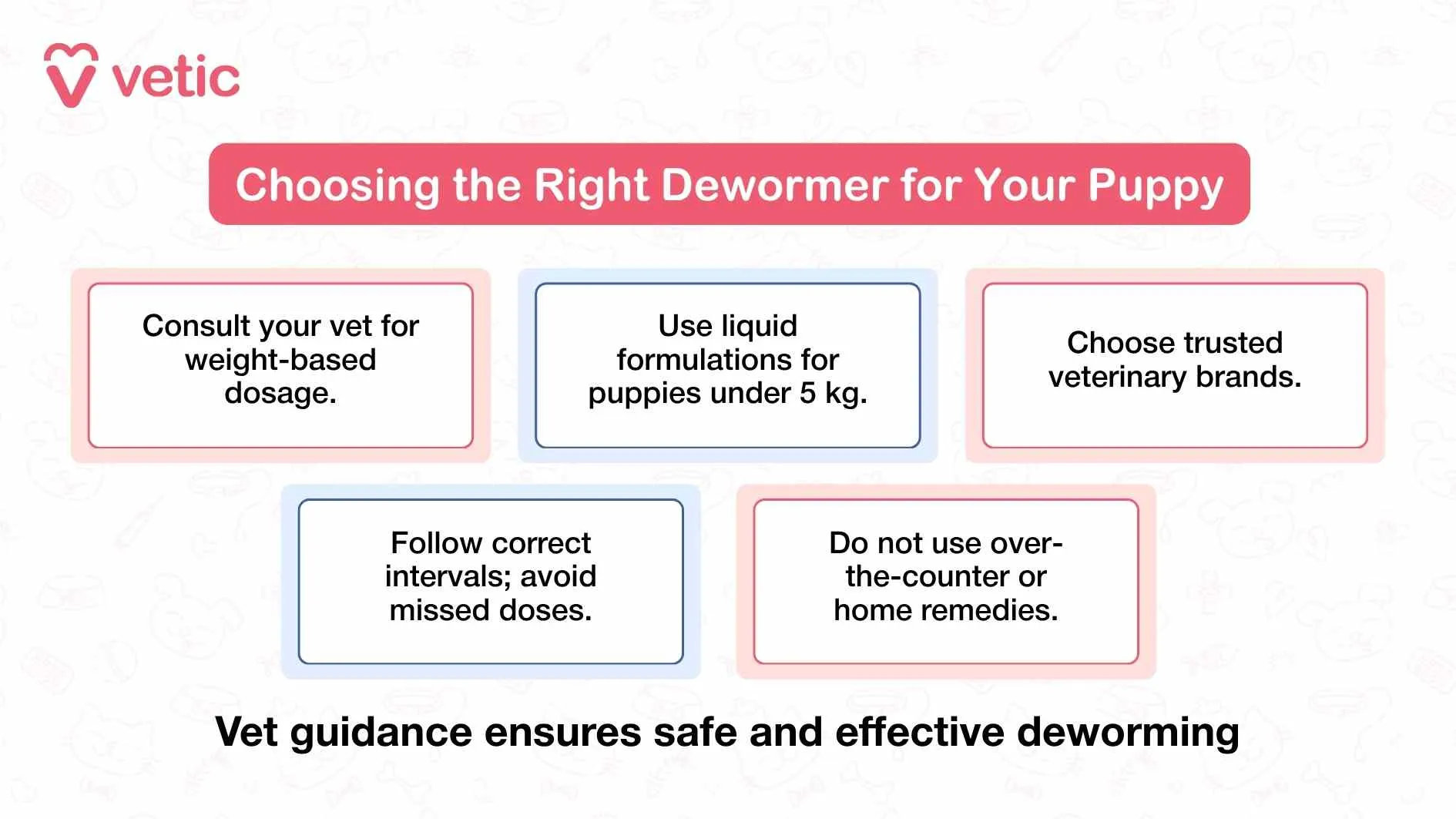 Image outlining six essential considerations for pet parents when choosing a dewormer for their puppy, including vet consultation, dosage, and brand.
Image outlining six essential considerations for pet parents when choosing a dewormer for their puppy, including vet consultation, dosage, and brand.
Selecting the ideal dewormer for your puppy is a decision that requires careful consideration and professional guidance. Not all dog dewormers are created equally, and the best choice will depend on several factors, including your puppy’s age, weight, and overall health status. Veterinarians also take into account local parasite prevalence and your pup’s specific exposure risks, such as whether they frequent outdoor play areas or live in a multi-dog household. Consulting with a vet ensures you make an informed decision that prioritizes safety and effectiveness.
Veterinarians typically recommend well-tested, trusted brands known for their consistent results and minimal side effects. They can provide essential guidance on:
- Correct dosage per kilogram of body weight: Underdosing can leave parasites behind, while overdosing can cause adverse reactions.
- Safe intervals between doses: Adhering to the correct schedule is crucial for breaking the parasite life cycle.
- Combination protection: If your puppy also needs best treatment to prevent ticks on dogs or flea control, your vet can recommend products that offer integrated protection.
Never attempt to split tablets or guess quantities, as improper dosing can significantly reduce the efficacy of the treatment or cause digestive upset in your puppy. For comprehensive parasite management, including solutions like flea tick meds for dogs, always rely on your veterinarian’s expertise.
Dewormers for Dogs: When Should You Switch From a Suspension to Tablets?
As puppies mature, administering large volumes of liquid medication can become challenging and often messy. Once your puppy reaches approximately 5 kg in weight, your veterinarian may suggest transitioning from a liquid suspension to deworming tablets for puppies.
Tablets offer a more convenient option for many pet parents, as they can be easily hidden inside treats or specialized pouches, ensuring accurate intake with less stress for both you and your puppy. This method helps to avoid under-dosing, which is a significant factor contributing to worm resistance. For very small breeds, however, your vet might still recommend liquid dosing due to the need for extreme precision. It is always best to follow professional advice when making this transition to ensure your puppy continues to receive effective and safe parasite treatment.
What Is the Composition of Dewormers for Dogs?
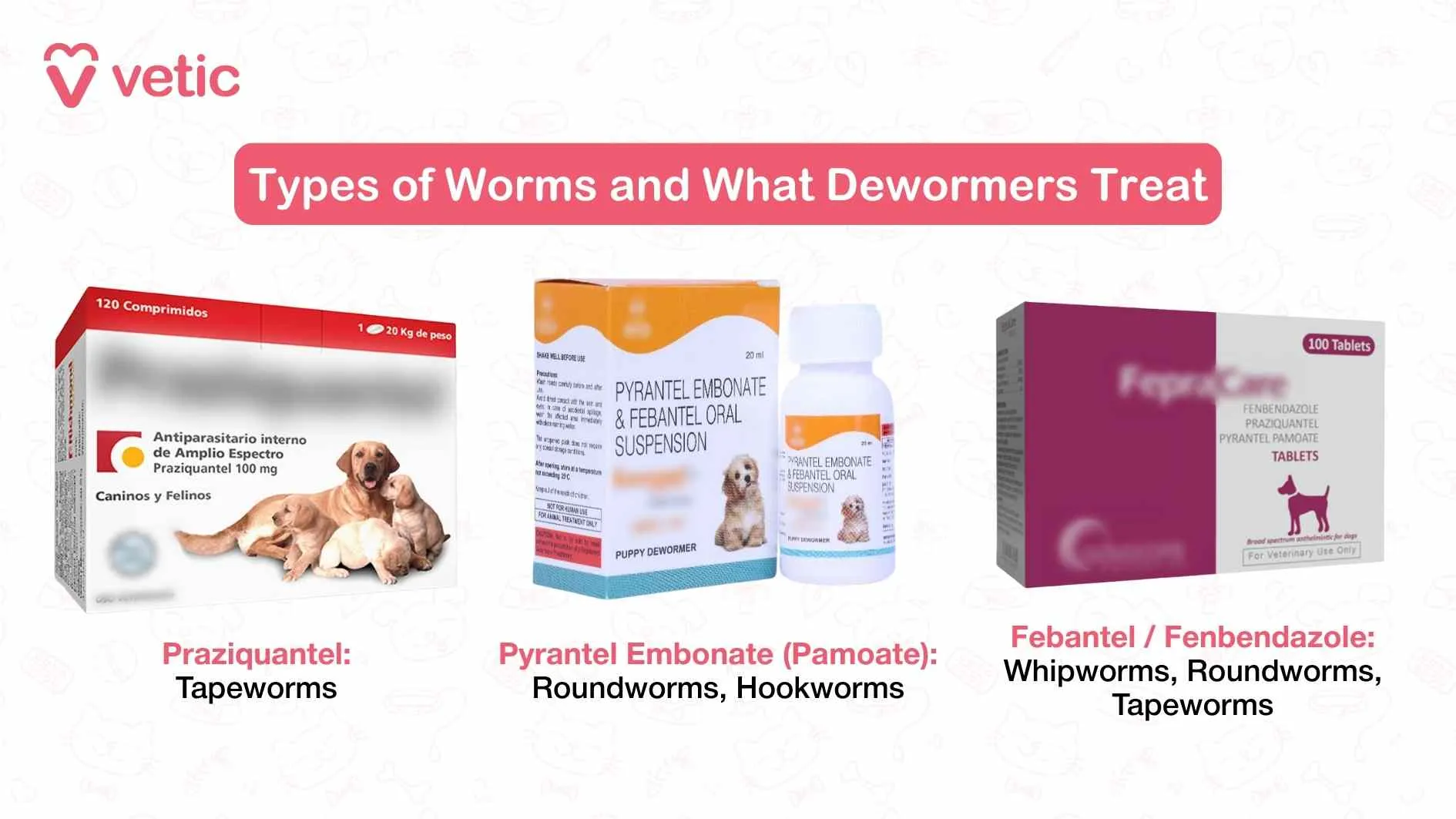 Image showcasing three common deworming compounds and the specific parasites they target, including Praziquantel for tapeworms and Pyrantel Embonate for roundworms and hookworms.
Image showcasing three common deworming compounds and the specific parasites they target, including Praziquantel for tapeworms and Pyrantel Embonate for roundworms and hookworms.
Most broad-spectrum deworming tablets for dogs are formulated with a combination of three highly effective ingredients to combat a wide range of internal parasites. This potent trio typically includes:
- Praziquantel: This ingredient specifically targets and effectively eliminates tapeworms, which are often transmitted by fleas.
- Pyrantel embonate (pamoate): This compound is active against hookworms and roundworms, common parasites found in puppies and adult dogs.
- Febantel: This broadens the coverage to include whipworms, ensuring comprehensive protection against most intestinal parasites prevalent in dogs.
This carefully chosen combination ensures that a single dose can effectively clear almost all common intestinal parasites. Some advanced formulations may even include probiotics or essential vitamins to support gut health and aid in recovery during the deworming process, further enhancing your puppy’s overall well-being.
How Frequently Should You Deworm Your Adult Dog?
For adult dogs, a deworming interval of every three months is generally considered sufficient to maintain good health and prevent significant parasite burdens. However, for dogs that frequently socialize in environments like boarding facilities, dog parks, or training centers, or those with higher exposure risks, more frequent deworming or specialized formulations might be necessary. Your veterinarian can provide tailored advice based on your dog’s lifestyle and risk factors.
Beyond medication, environmental hygiene plays a critical role in preventing worm reinfection. Always clean up feces promptly, wash food and water bowls daily, and prevent your dog from drinking stagnant water. These simple yet effective practices significantly amplify the protection offered by the best deworming tablets for dogs, ensuring a healthier environment for your pet. Implementing a comprehensive strategy, including the most effective tick and flea treatment for dogs, can further reduce overall parasite exposure.
Do the Common Dewormers for Dogs Always Work?
While most deworming medicines for dogs are highly effective when administered correctly, reinfection remains a possibility. Dogs can easily ingest worm eggs by sniffing or licking contaminated ground, even in seemingly clean environments.
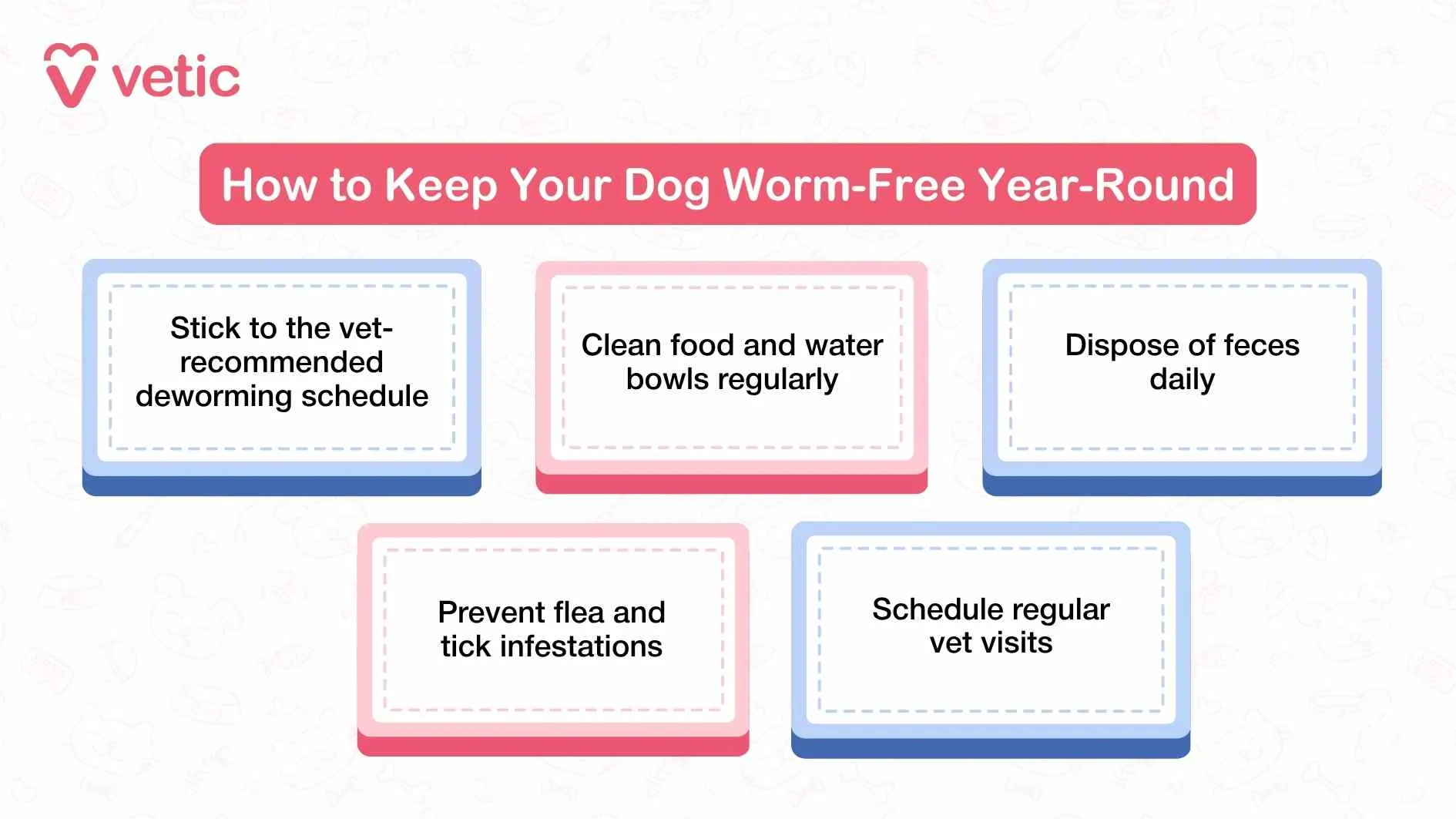
To ensure long-term success in keeping your dog worm-free, consider these important steps:
- Deworm all pets in the household simultaneously: This prevents cross-contamination and breaks the cycle of reinfection.
- Schedule regular stool tests: A stool test every 6–12 months can confirm parasite clearance and detect any new infestations.
- Avoid unnecessary brand rotation: Only switch dewormer brands if your veterinarian suspects resistance; frequent, unwarranted changes can sometimes lead to reduced efficacy.
Regular veterinary check-ups are crucial to confirm that your chosen dewormer for dogs continues to work as intended and to adjust your strategy as needed for optimal parasite control. Maintaining a consistent deworming schedule, combined with a safe and effective flea and tick treatment for dogs, creates a robust defense against various parasites.
When to NOT Deworm Your Dog
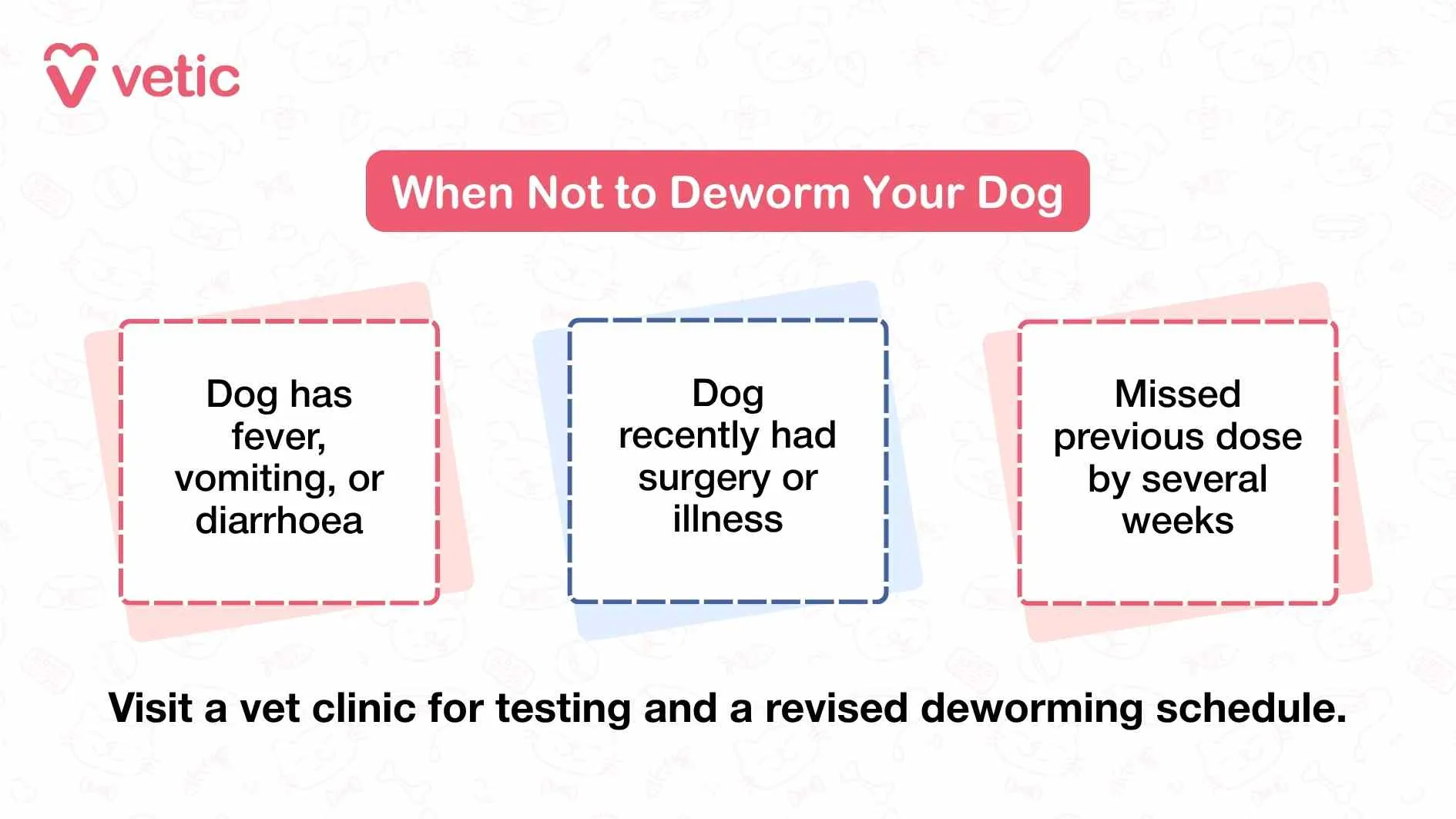 Image highlighting three key conditions under which deworming a dog should be postponed: fever, vomiting, or diarrhea; recent surgery or illness; and missed doses over several weeks.
Image highlighting three key conditions under which deworming a dog should be postponed: fever, vomiting, or diarrhea; recent surgery or illness; and missed doses over several weeks.
There are specific circumstances when administering deworming tablets for puppies or adult dogs should be postponed to avoid causing further harm. Skip deworming if your dog is exhibiting symptoms such as vomiting, diarrhea, or appears feverish. Giving medication during these times can exacerbate dehydration, worsen gastrointestinal distress, or potentially lead to toxicity due to their compromised state.
Instead, seek immediate veterinary attention for a proper diagnosis and stabilization. Once your pet is stable, your veterinarian will be able to design a safer and more appropriate deworming schedule. Furthermore, if you have missed deworming doses for several weeks, do not attempt to compensate by doubling the amount. Instead, consult your vet so they can restart the deworming cycle gradually and safely. Prioritizing your dog’s current health status is always paramount before proceeding with any medication.
Conclusion
Deworming is an indispensable part of responsible pet ownership, especially when it comes to the delicate systems of puppies. Choosing the right deworming tablets for puppies and adhering to a consistent schedule, guided by your veterinarian, is crucial for protecting your furry companion from unseen internal threats. This proactive approach not only safeguards your puppy’s growth and vitality but also helps keep your home environment parasite-free, ensuring the health and safety of your entire family. Regular consultations with your vet will ensure your deworming strategy remains effective and tailored to your pet’s evolving needs.
FAQ on Dewormers for Dogs
Why is deworming important for puppies and dogs?
It eliminates internal parasites that can steal essential nutrients and damage organs, thereby ensuring your dog remains strong, healthy, and free from infection.
At what age should puppies be dewormed first?
Puppies should receive their first deworming treatment at around 30 days old, using a liquid dewormer prescribed by your veterinarian.
How often should adult dogs be dewormed?
For most adult dogs, deworming every 3 months is sufficient. However, dogs that frequently roam outdoors or have higher exposure risks may require more frequent treatments.
Is deworming dogs necessary before pregnancy?
Yes, it is crucial. Treating the mother before breeding helps prevent the transmission of worms to her unborn puppies.
How does deworming affect a dog’s immunity and overall health?
Deworming supports optimal nutrient absorption, significantly reduces the body’s toxin load, and helps maintain a balanced and robust immune response.
What are the signs that my dog may have worms?
Common signs include scooting their rear on the ground, a bloated belly, a dull coat, diarrhea, unexplained weight loss, or visible worms in their stool.
Can deworming dogs prevent transmission of worms to humans?
Yes. Routine deworming greatly reduces the zoonotic risk, thereby protecting your family from potential exposure to parasites.
Are there side effects of dewormers for dogs?
Mild side effects such as soft stool or a temporary loss of appetite can occur. Serious reactions are rare, especially when following veterinary guidance.
Do indoor dogs and pups also need regular deworming?
Absolutely. Worm eggs can easily be tracked into homes on footwear, carried by other pets, or even introduced through contaminated food, making indoor dogs equally susceptible.
What happens if I skip my dog’s deworming schedule?
Skipping doses allows parasites to multiply rapidly, leading to poor digestion, anemia, and general weakness over time. Always speak with your vet to resume their deworming routine safely.
Can I give over-the-counter deworming medicine to my dog without a vet’s advice?
No. Incorrect ingredients or dosages can be harmful or lead to insufficient deworming, which can foster parasite resistance. Always consult your veterinarian first.
What role do diet and hygiene play in preventing worms in dogs?
A balanced, nutritious diet and clean living surroundings are vital. They strengthen gut health, reduce the risk of reinfection, and complement the effectiveness of deworming treatments.
